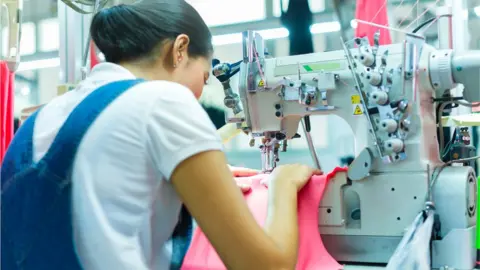MPs say fast fashion brands inaction on ethics is shocking
 Getty Images
Getty ImagesFashion retailers JD Sports, Sports Direct and Boohoo, are "failing to commit" to reducing their environmental and social impact, MPs say.
Amazon, TK Maxx and Missguided were also described by the Environmental Audit Committee (EAC) as being among the "least engaged" in sustainable fashion and labour market initiatives.
The EAC said it was "shocking" the firms were "failing to take action".
Boohoo said the report did not reflect its commitment to sustainability.
The findings are part of the EAC's inquiry into the sustainability of the fashion industry.
The inquiry was prompted by the popularity of "fast fashion... cheap clothing, with quick turnover that encourages repurchasing".
Disposable fashion has come under fire, not only for the amount that ends up in landfill, but also because it can release toxic chemicals in production and plastic fibres when it is washed.
Last summer the committee wrote to 16 fashion retailers asking what they were doing to cut the environmental and social impact of the clothes and shoes they sell.
Specific questions included what the brands were doing about using organic or sustainable cotton; limiting the discharge of hazardous chemicals and the re-use or recycling of unsold stock.
The interim report ranks brands according to how "engaged" they are in their commitment to sustainable fashion and labour market initiatives.
The "most engaged" were named as Asos, Marks & Spencer Tesco, Primark and Burberry.
All of them use organic or sustainable cotton and old materials and encourage customers to return old clothing.
The "moderately engaged" retailers were Next, Debenhams, Arcadia Group and Asda.
The EAC said each of them had taken "some steps" to address environmental sustainability issues.
All of them except Next run a return scheme for discarded clothes and all of them except Asda use organic cotton in some clothes.
Kurt Geiger was also approached but did not respond to requests for written evidence, the EAC said.
'Re-iterate commitment'
The retailers were also asked if they were members of the ACT (Action, Collaboration, Transformation) labour rights and living wage agreement and the SCAP (Sustainable Clothing Action Plan) to reduce their carbon, water and waste footprint.
With the exception of Burberry all the other "moderately engaged" and "most engaged" retailers participated in one or other or both of these schemes.
Of the six "least engaged" retailers none was a member of either of these initiatives,
In a statement, Boohoo said it wanted to "re-iterate its commitment to being involved in the ongoing discussion on the sustainability of fashion.
"This initial report does not fully reflect the policies and procedures and independent initiatives that we have in place, or the extent of our ongoing commitment in the area of sustainability."
JD Sports said "As a business, we participate in a number of ethical initiatives which fall outside the narrow list referred to in the Committee's report."
 Getty Images
Getty ImagesIt added that most of the group's sales came from third party brands, including "two [Nike and Adidas] internationally recognised as industry leaders with regards to driving sustainability".
"Private label sales make up the rest of the Group's sales and there is an ongoing project to review options on improving the sustainability of our manufactured garments," it added.
Amazon declined to comment.
'Customers can choose'
EAC chair Mary Creagh said: "It's shocking to see that a group of major retailers are failing to take action to promote environmental sustainability and protect their workers.
"By publishing this information, customers can choose whether they want to spend money with a company that is doing little to protect the environment or promote proper wages for garment workers.
"We hope this motivates underperforming retailers to start taking responsibility for their workers and their environmental impact."
The committee concluded that the UK fashion industry's current business model was "clearly unsustainable, especially with a growing middle-class population and rising levels of consumption across the globe".

How did the fashion brands do?
"Least engaged": JD Sports, Sports Direct, Boohoo, Amazon, TK Maxx, Missguided
"Moderately engaged": Next, Debenhams, Arcadia Group, Asda.
"Most engaged": Asos, Marks & Spencer Tesco, Primark and Burberry.
Kurt Geiger did not respond to the EAC's requests

The committee said it intended to publish its final report in the coming weeks in which it will outline recommendations for government policies to "encourage a more transparent, fair and sustainable fashion system".
Francois Souchet of the Ellen MacArthur Foundation said the committee was right that the "fashion industry's current business model cannot work in the long term".
He said worldwide one truckload of clothing was landfilled or incinerated every second, while less than 1% of old clothing goes on to be used to make new clothes.
"We need a redesign for the fashion industry, so business models increase clothing's use, clothing is made from safe and renewable materials and old clothing is used to make new clothes."
